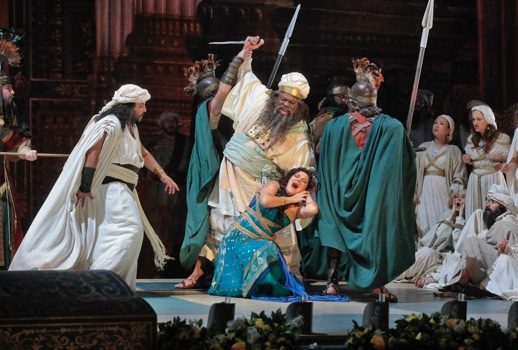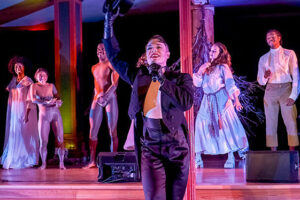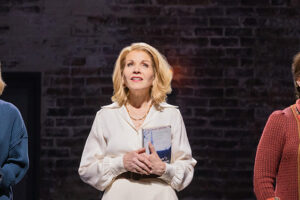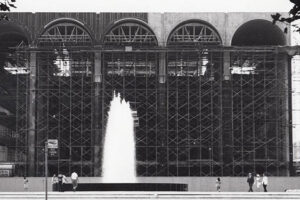

We have blood; cue the thunder!
I have no doubt that Opera is time travel. Sitting in a theater watching a performance of a work that’s held the stage regularly (or sometimes, more excitingly, not so regularly) brings with it an experience that can throw your mind all the back to that work’s premiere.
I often listen to singers and wonder what the composer would think of a particular performance one hundred years and more since the work was written. Then I dig further and discover that the politics of that moment helped light the audience’s imagination and devotion to a particular piece and it becomes even more meaningful in that context.
Just the other night at a performance of Puccini’s Tosca the murder of Baron Scarpia brought a round of applause at Opera Omaha. Surely not a reaction I’ve seen or even heard of before but undoubtedly an honest and, I may say, timely response. So what if you could time travel back to the first run of Giuseppe Verdi’s first great success Nabucco?
Playing the work as an opera within a play at La Scala in 1842 before Italy become a unified country and the northern regions was occupied by Austriais the conceit of Director/Designer Thaddeus Strassberger’s production here at LA Opera. (It’s previously been presented by Washington National Opera, Minnesota Opera, and Opera Philadelphia originating in 2012.)
A liveried footman commences the evening by lighting the tapers in the footlights one by one as a small phalanx of Austrian soldiers offer protection to the Austrian nobility taking their seats in the tier of boxes stage right. The stage curtain rises on what could be a near perfect recreation of an ottocento opera production of Verdi’s era.
With colorful trompe l’oeil drops layered in forced perspective and painted to resemble Babylon all look straight out of your grandmother’s copy of the Victor Book of the Opera. Relentlessly opulent costumes by Mattie Ullrich skillfully invoke the biblical filtered through the lens of the 1850’s in hyper-glamorous jewel tones and (seemingly) luxurious fabrics.
Mark McCullough’s subtle and evocative lighting goes a long way towards highlighting playing spaces and drawing attention to important details in a staging that tends toward the static because of its style of presentation. Not that this is necessarily a shortcoming.
All bel canto opera features a certain amount of prelude and postludes abutting or amending musical set pieces and it’s the directors job to make certain everyone is in place or getting there during these interludes. In this Mr. Strassberger exceeds to a level that would have made C.B. DeMille envious.
The level of pageantry, which was never over-inflated I might add, as well as the beauty of the tableaus presented were a pleasure to the eye and even recalled classical painting. A masterful job highlighted by one or two decidedly modern and creative touches some of which were inspiring indeed. More of that anon.
This was not my first trip to Babylon and early Verdi relies so much more on its interpreters than his later works which, in the hands of merely competent musicians, can almost play themselves they are so skillfully written. LA Opera has assembled a veritable Golden Age cast for the this challenging work.
I have to start with our music director James Conlon and the forces of the LA Opera Orchestra who outdid themselves with the vigor and flexibility of their playing. For anyone who knows Verdi you can feel him finding his way in Nabucco. Many of his orchestral effects, to say nothing of some of the vocal writing, are crude by the standards set by his middle period operas, Rigoletto, Trovatore and Traviata.
Too often I think conductors try to polish the earlier works to dampen and smooth these effects. Mr. Conlon took no such measures and embraced Verdi’s score and showcased its primitive and youthful character to the point of making it the cornerstone of his interpretation. Details I had never heard before were brought forward throughout the evening.
The violently slashing up and down figures the strings play to accompany the bass cabaletta,”Come notte a sol fulgente” in the first scene was just the first of many that brought the score a muscular vitality I hadn’t experienced before.
Mind you when you have Morris Robinson as Zaccaria you’d better bring the big guns because he does not come to play. All evening long he hurled into the auditorium the kind of dramatic bass sound that induces awe in the listener. His Act II aria,”Tu sul labbro de’ veggenti” brought down the house and Mr. Strassberger’s staging made certain it was a deserving showcase for his talents.
The Fenena and Ismaele were Nancy Fabiola Herrera and Mario Chang who have respectively been presented by LA Opera as Carmen and Rodolfo in Boheme. Surely an embarrassment of riches in casting these two as the haplessly conventional Romeo and Juliet of the plot. Sadly they get few solo moments and mostly fill out the ensembles.
Mr. Chang’s moment to shine comes at the top of the second act and I’m sorry to say he got swamped by an over-lusty men’s chorus. Ms. Herrera however did a fine job with her wee aria in the final scene where she wasn’t threatened by choral back up.
One of the stagings interesting touches was the characterization of the High Priest of Baal as a grotesque supporting himself on uneven sticks while he lurched across the stage in desperate need of a manicure (think Howard Hughes). He also has an entourage of velveteen whirling dervishes at his command, which adds to the underlying creepiness.
Bass Gabriel Vamvulescu not only made all of this work but brings, yet another, powerhouse voice to the production that commands attention.
The role of the warrior princess Abigaille is probably just as famous for the sopranos who’ve attempted it and abandoned it as those who’ve been offered it and turned it down. One can only wonder how the first interpreter of the role, Giuseppina Strepponi, ended up becoming Verdi’s common law wife after he wrote an essentially unsingable part which may have hastened the end of her own illustrious career.
In one of the best entrances I’ve ever witnessed soprano Liudmyla Monastryrska took the stage advanced by two palace guards and a prisoner. Ms. Monastryrska then threw the prisoner to his knees in front of her and his throat while singing her opening lines. She is exactly the kind of singer Ethan Mordden had in mind when he coined the adjective “demented.”
She breathed fire all over the most ungrateful vocal writing even to the point of decorating the reprise of her cabaletta, “Salgo gia del trono aurato” like a boss. Not that it was all musical blunt force trauma, mind you. That cabaletta was introduced by an impossibly delicate rendering of “Anch’io dischiuso un giorno” that was all vocal filigree rendered right on the breath. Ms. Monastryska triumphs over this dizzyingly difficult role and she is exactly the kind of singer this opera waits for.
Speaking of time passing I just want to be clear that I was not the wag in the lobby who said that the opera would have been better titled, Methuselah. Yet I did laugh. Placido Domingo is just a few months short of his 77th birthdate. Naturally this is cause for great rejoicing. The Grand Seigneur of LA Opera is almost single handedly responsible for the fact that we even have an opera company that is flourishing.
No he is not a baritone. Although his voice was uncommonly rich for a tenor it’s more about what he has left to work with and, rest assured, work with it he does. At the top of the evening you could tell there was effort but surprisingly Nabucco is a good fit because it’s written high even for a Verdi baritone.
He really didn’t reach peak performance until the confrontation with Abigaille and he’s better in the fleeter bits until he gets his legato going. Apparently his knees work better than mine because the man was up and down all night long with no unreasonable effort. The voice remains uncommonly resonant and the fact that he’s still as capable is nothing short of an astonishment. At this point in the career his stage presence is such that I don’t think he even requires a spotlight.
I need to make special mention of the Anna of Ms. Liv Redpath. Sadly Verdi gave her but a few short solo lines but she has a youthful timbre and quicksilver bloom on the voice that is rare indeed. I don’t want to spoil but she does have special moment in the curtain calls, which are staged for theatrical effect, and she is the perfect choice for that cameo so don’t try to beat the traffic home for once..
Arguably Nabucco’s main protagonist is the chorus and, under Director Grant Gershon, the LA Opera Chorus acquitted itself with valor. There was strength and a full range of dynamics so it wasn’t all loud and louder. The great Act II finale was full blooded and Maestro Conlon kept things tight.
Naturally the showpiece is, “Va, pensiero” and here Mr. Strassberger did something very special indeed. From the top of the introduction the front pieces of the set fell away and we were suddenly transported backstage at the performance looking out onto the stage through a scrim while the chorus assembled upstage.
Meanwhile the downstage is populated with lady’s maid’s sewing, and dancers practicing, and costumiers, and theater technicians lighting the candles on a fake moon before sending it aloft. Naturally by the end of the scene positively everyone is singing the unofficial Italian anthem and it’s a beautiful moment.
So run, don’t walk to the Music Center for the last three performances this month because chances of seeing this work this well presented, to say nothing of well sung, again are rare indeed.























Comments